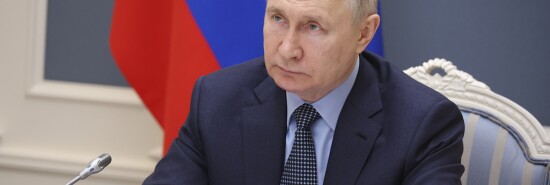
The threat of Putin’s ‘Nuclear Force Z’
Jon Sweet Mark Toth
Video Embed
Ukraine’s long-anticipated counteroffensive is nearing, and the deadly gamesmanship between Kyiv and Moscow is intensifying. While Bakhmut ostensibly has fallen to Moscow, Ukrainian President Volodymyr Zelensky ensured any sense of a Russian victory was fleeting by enabling, if not orchestrating, a Mission: Impossible-like raid into Belgorod.
The cross-border incursion by the Russian-manned Liberty of Russia Legion and the Russian Volunteer Corps proved highly embarrassing to Russian President Vladimir Putin. Now, there are reports it has forced the Kremlin to reposition military forces to reinforce its southern border. That movement makes Russian ground forces vulnerable to Ukrainian artillery and drone strikes.
BIDEN NEEDS TO SHELVE TAX INCREASES AND FOCUS ON SPENDING
Moscow is clearly rattled. Its once-vaunted and feared conventional military forces have been proven to be a hollow fighting force. Now, not only is Russia humiliatingly exposed on its eastern border, but its troops in besieged Bakhmut are being flanked by Ukrainian forces, and Crimea is now in play thanks to the United Kingdom’s Storm Shadow and is vulnerable to being cut off.
The Kremlin is increasingly running out of military options as Putin’s weakened army begins to run on empty. Even Yevgeny Prigozhin, the head of the Wagner Group, admitted in an interview, as transcribed by Russian media expert and Daily Beast writer Julia Davis, that Russia’s army was never as strong as advertised.
This reality could not come at a worse time for Putin — or at a better time for the Ukraine military. To that end, Ukrainian Secretary of the National Security and Defense Council Oleksiy Danilov taunted Russia early on Saturday in an exclusive interview with the BBC that Kyiv’s counteroffensive could start “tomorrow, the day after tomorrow, or in a week.” Kyiv, knowing a long, steady line of U.S.- and NATO-supplied military equipment is coming, now including F-16s, is pressing its growing advantage.
Absent alternatives, there are increasing indications Putin might once again be plotting a red flag incident at the Zaporizhzhia Nuclear Power Plant. In August 2022, we coined the ZNPP as Putin’s “Nuclear Force Z.” Until now, other than recklessly endangering the ZNPP, Putin has forestalled creating a nuclear incident at the facility. However, there is increasing alarm by Ukraine’s Defense Intelligence that Russia is “preparing a massive provocation” at the ZNPP, including the “leakage of the radioactive substances.”
The timing of such a “Nuclear Force Z” incident, were it to occur, is not yet clear. Nonetheless, it is highly likely it would be timed either to forestall, via a preemptive strike, a Ukrainian counteroffensive against weakened Russian positions in the Donbas and/or Crimean Peninsula or disrupt it by creating a humanitarian crisis potentially larger than the Chernobyl nuclear disaster in 1986. Notably, the fallout from that nuclear meltdown affected large swaths of Europe.
The Biden administration, therefore, in partnership with NATO, must be unequivocal in drawing Putin a nonnegotiable redline, making known in clear terms the repercussions Moscow will face if the Kremlin unleashes its “Nuclear Force Z.” They must do so not just in terms of what it would mean in Europe, but in North Korea and Iran as well in terms of the greenlight signals it will send to them, especially as the latter is already close to unlocking the gates of a nuclear Armageddon.
Brussels and the Biden administration must act now. Given repeated nuclear threats on Russian state-controlled media, especially by Margarita Simonyan and Vladimir Solovyov, and Russian designs to unleash a “Nuclear Force Z” on Ukraine, there must no longer be any strategic ambiguity. Washington must make it publicly clear that any use by Putin of nuclear weapons or fallout would result in a swift and decisive NATO response.
CLICK HERE TO READ MORE FROM THE WASHINGTON EXAMINER
Jonathan Sweet (@JESweet2022), a retired Army colonel, served 30 years as a military intelligence officer. He led the U.S. European Command Intelligence Engagement Division from 2012-14, working with NATO partners in the Black Sea and Baltics. Mark Toth (@MCTothSTL) writes on national security and foreign policy. He was formerly an economist and entrepreneur who has worked in banking, insurance, publishing, and global commerce.
